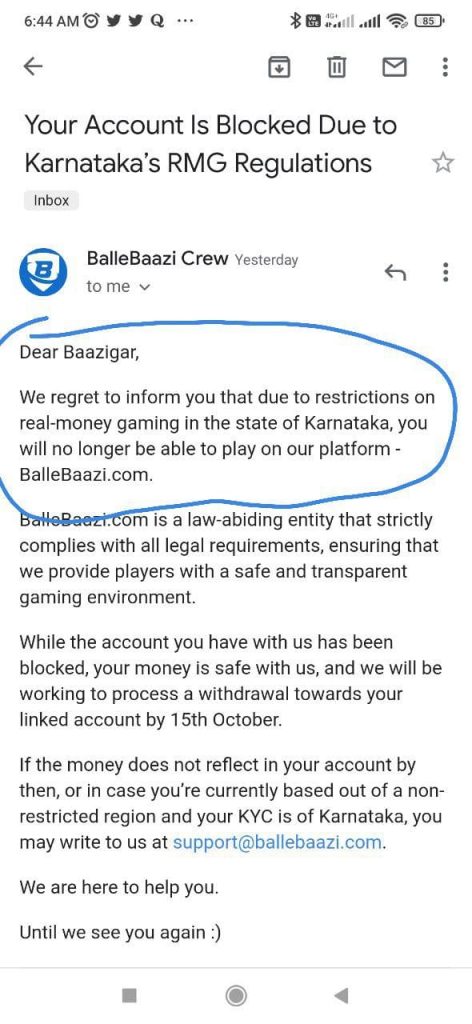Real money gaming startups have started blocking access to residents of Karnataka after the state government notified the online gaming ban law for stakes with immediate effect on October 5. The law passed last month by the legislature received governor assent on October 4. The law comes into effect at a crucial stage when gaming entities are looking to cash in on the long cricket playing season which started with second leg of IPL and is followed by the T20 World Cup.
The law is likely to be challenged in courts, as similar bans by neighbouring states Tamil Nadu and Kerala were struck down by Madras High Court and Kerala High Court respectively in recent months.
Bengaluru based unicorn gaming startup Mobile Premier League (MPL), which hosts online tournaments across more than 70 mobile games, has updated its terms and conditions to prohibit residents of Karnataka from accessing the platform. “Persons residing in the state of Assam, Odisha, Nagaland, Sikkim, Meghalaya, Andhra Pradesh, Karnataka, and Telangana (“Restricted States”) are prohibited from participating in any Mobile Games on the Platform,” read the updated terms and conditions on the website. The platform, however, allows users to play free battles as first reported by Money Control.
Meanwhile, fantasy sports platform BalleBaazi has sent an email notice to its users in Karnataka saying that they will no longer be able to play on the platform due to restrictions on real-money gaming in the state. “We regret to inform you that due to restrictions on real-money gaming in the state of Karnataka, you will no longer be able to play on our platform – BalleBaazi.com,” read the mail.
BalleBaazi is working on fund withdrawals for users whose amounts are pending with the company. “While the account you have with us has been blocked, your money is safe with us, and we will be working to process a withdrawal towards your linked account by 15th October,” the company said in the email.

Fantasy gaming leader Dream11 yet to comply with the law
It’s unclear whether real money gaming leader Dream11 is following the suit, since the app is broken at present, likely due to a glitchy update that was released on Tuesday night. The terms and conditions of Dream11 were last updated on 27 May 2021 (at the time of writing this) and appears not updated any time recently. We’ve emailed to Dream11 for confirmation and will update once we hear back.
Dream11 and MPL are members of the industry body FIFS. We have also reached out to FIFS for their comments. “We request the Karnataka government to remove any ambiguity or uncertainty in the bill to ensure continuity and growth of the fantasy sports sector in the State. FIFS and its members strongly believe that certainty is integral to the rule of law and hence the bill needs to provide certainty and clarity to businesses, the investor community as well as consumers for the orderly growth and development of the industry,” FIFS said in a statement last month when the legislation was introduced.
FIFS’ legal experts opined that the law’s agenda is contrary to a catena of judgments delivered by the courts. In fact, vide judgment dated 30 July 2021 the Supreme Court has upheld the validity of online fantasy sports by stating that the issue of whether fantasy sports format amounts to gambling or betting or wagering is no longer res integra.
Moreover, the Supreme Court also reaffirmed the judgments of the Rajasthan, Punjab, and Haryana, and Bombay High Courts all of which upheld the validity of fantasy sports as being legitimate businesses entitled to protection under Article 19(1)(g) and Article 14 of the Constitution of India.
The Rajasthan High Court vide judgment dated 22 July 2021, opined as follows (extract below):
“We are, therefore, of the view that offering of online fantasy sports in accordance with the Charter of the FIFS has already been judicially recognized as a business and consequently, entitled to protection under Article 19(1)(g) of the Constitution of India and the prayer seeking directions to the State Government to prohibit the same would be opposed to Article 14 and 19(1)(g) of the Constitution of India.”
Saahil Nalwaya v. State of Rajasthan D.B. Civil Writ Petition No. 2026/2021



